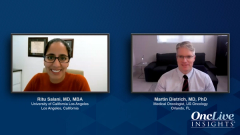
Exploring HER2 as a Pan Tumor Biomarker
Martin Dietrich, MD, PhD, presents a thorough analysis of HER2 as a pan-tumor biomarker, underscoring its universal importance in the field of oncology.
Episodes in this series

This transcript is a conversation between Dr. Ritu Salani, a gynecologic oncologist at UCLA, and Dr. Martin Dietrich, a medical oncologist at US Oncology in Orlando, Florida. They discuss the exciting developments in HER2-directed antibody-drug conjugates (ADCs) across solid tumors.
Dr. Dietrich explains that HER2 has evolved into a versatile biomarker, with implications for therapeutic treatments and agents targeting HER2. Traditionally, HER2 amplification was the main way to use it, first introduced over 25 years ago in HER2-amplified breast cancer. However, HER2 has morphed into a more complex biomarker, with intracellular kinase domain mutations seen in lung, breast, colon, and other cancers, as well as epigenetic mechanisms of HER2 expression that may not result from amplification.
Targeting HER2 in the era of ADCs allows for a broader approach, but there are many considerations, such as varying biomarkers and cutoffs across different tumor types. Breast cancer was the first frontier, with the HER2-low profile emerging as a new biomarker spectrum distinct from HER2-amplified disease. In HER2-low cases, even low levels of HER2 expression (1+ or 2+) may be sufficient for delivering ADCs into the tumor environment.
Dr. Salani agrees, noting that in gynecologic malignancies, there is no standard way of measuring HER2, with studies looking at gene mutations, amplifications, and now shifting towards overexpression. The gynecologic oncology community has less experience than medical oncology but has been using trastuzumab for about half a decade in endometrial cancer. Dr. Salani is excited about the newer data and believes HER2-targeted therapies will become key players in select gynecologic malignancies.
Summary generated by Claude AI.





































